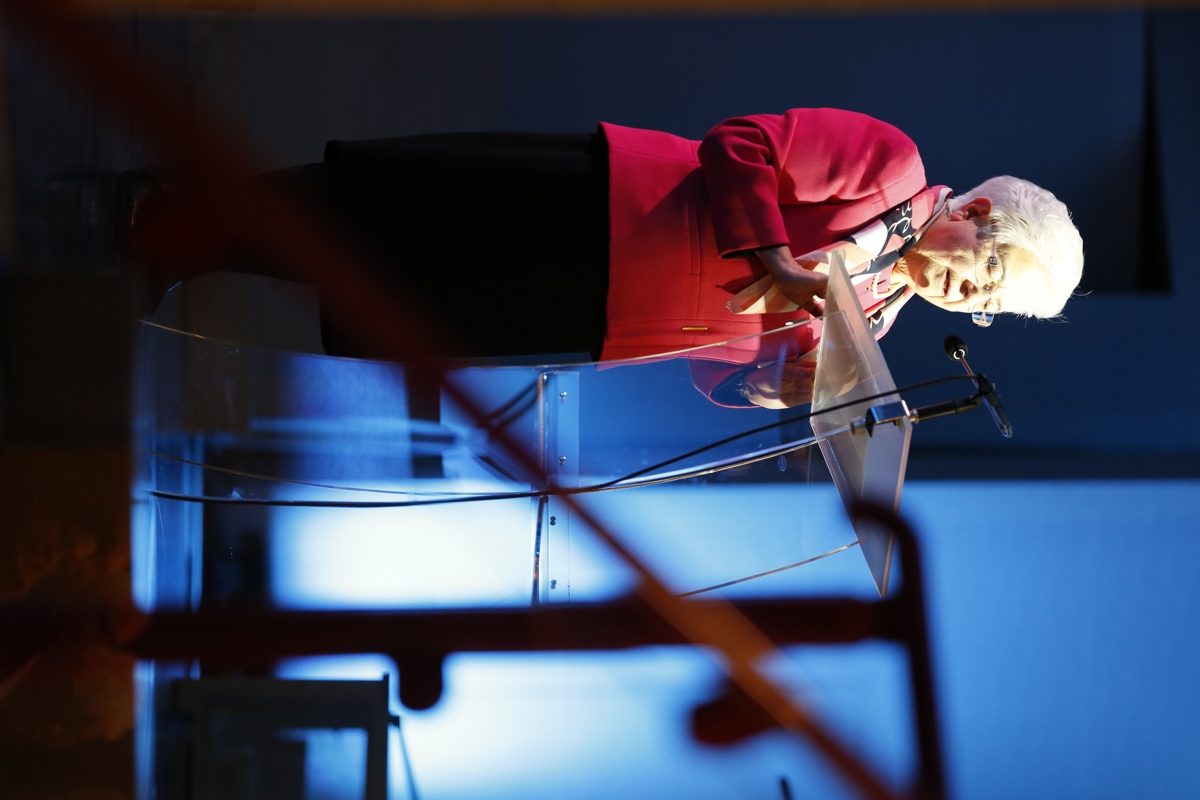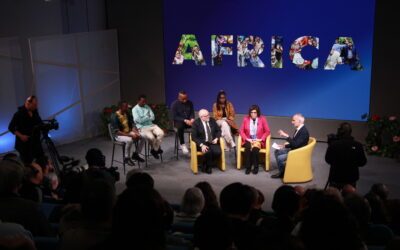 “What we wish to do today is not so much remember as to review together, after 20 years, the content and method which Chiara outlined at UNESCO on the 17th December 1996 on a subject which is more than ever relevant to international relations, education for peace. On that occasion UNESCO conferred on the founder of the Focolare Movement a special prize awarded to those whose work contributes to creating pathways and conditions whereby peace may become something real.” Maria Voce, the President of the Focolare, recalled that event in her talk given on 12th March at Castel Gandolfo, during the afternoon dedicated to Chiara Lubich and peace, in the presence of ambassadors and leading figures in the worlds of culture and Christian unity. “Looking at that occasion again today, it seems more than ever relevant: what could be more important than education to reach this kind of goal? Current affairs, what we see before us day after day, portray images of a peace that has been violated and often scorned. It seems almost as though, from the daily life of individuals right up to international level, “living in peace” is not part of what the generations living in the Third Millennium do. Yet how often do we appeal for peace or try to reconnect the broken strands of relationships among individuals, peoples and states? We cannot deny that we find it easier to put up barriers, perhaps thinking we are defending ourselves, instead of working to build unity in relations, among ideas, in politics, in economics and between religious viewpoints. Hence peace escapes us and is ever more distant. At UNESCO Headquarters, Chiara Lubich put forward a method for education to peace, the spirituality of unity, which is a new lifestyle that can overcome divisions among individuals, communities and peoples and so can help restore or consolidate peace.
“What we wish to do today is not so much remember as to review together, after 20 years, the content and method which Chiara outlined at UNESCO on the 17th December 1996 on a subject which is more than ever relevant to international relations, education for peace. On that occasion UNESCO conferred on the founder of the Focolare Movement a special prize awarded to those whose work contributes to creating pathways and conditions whereby peace may become something real.” Maria Voce, the President of the Focolare, recalled that event in her talk given on 12th March at Castel Gandolfo, during the afternoon dedicated to Chiara Lubich and peace, in the presence of ambassadors and leading figures in the worlds of culture and Christian unity. “Looking at that occasion again today, it seems more than ever relevant: what could be more important than education to reach this kind of goal? Current affairs, what we see before us day after day, portray images of a peace that has been violated and often scorned. It seems almost as though, from the daily life of individuals right up to international level, “living in peace” is not part of what the generations living in the Third Millennium do. Yet how often do we appeal for peace or try to reconnect the broken strands of relationships among individuals, peoples and states? We cannot deny that we find it easier to put up barriers, perhaps thinking we are defending ourselves, instead of working to build unity in relations, among ideas, in politics, in economics and between religious viewpoints. Hence peace escapes us and is ever more distant. At UNESCO Headquarters, Chiara Lubich put forward a method for education to peace, the spirituality of unity, which is a new lifestyle that can overcome divisions among individuals, communities and peoples and so can help restore or consolidate peace. This spirituality is lived by people from very different backgrounds and experiences: Christians of different Churches, believers of different religions and people of different cultures. All of them are motivated by wanting to enable humankind become one single family; all know they must face problems and situations that arise daily at every level and in every field; all are directed towards being – at least wherever they are – and I quote Chiara “seeds of a new people, of a world at peace, with greater solidarity especially towards the least and the poorest; to be seeds of a more united world” (Chiara Lubich’s talk at UNESCO, 17.12.1996) in which it will be possible not only to call one another brothers and sisters but truly be so. If this is the method, what is the secret of its success? It is a secret which Chiara herself defined as the art of loving, which is “It means being the first to love, without expecting the other person to love us in return. It means knowing how to ‘make ourselves one’ with others, that is, to identify with their burdens, their thoughts, their sufferings, their joys. But, if this love of neighbour is lived out by more than one person, it becomes mutual. (Ibid.). Reciprocity: it is a word which carries much weight in international relations but is often limited to ensuring a truce in conflicts, not in preventing them or resolving them. Those who have responsibility and key roles in the international community know very well how difficult negotiations can be and how many obstacles are encountered before reaching agreements that satisfy all parties. To consider love as a negotiating tool in regard to the great objective of peace would allow us to feel part of one family, to live an authentic dimension of fraternity without restricting it merely to coexistence or forced shared living, but enabling fraternity to be open to the needs of the weakest and the poorest, of those who are excluded from political engagement or from a type of economics whose only law is profit. We need to love, then, and work for others and with others; so as to help overcome the barriers posed by conflicting interests, by a show of power, by inequality in levels of development, or lack of access to the market or technology. When speaking about peace education we find ourselves facing the great challenge of applying a method, that of unity as the fruit of mutual love, in the fragmented context currently enveloping almost all spheres of our daily life. Chiara Lubich was aware of this and for this reason offered the Representatives of Member States at UNESCO almost the key for a step change, a good practice, in the language used in international relations. In fact she said: «Nothing good, useful, or fruitful can be accomplished in the world without accepting troubles, suffering, in a word, without the cross.” (Ibid.). Commitment to peace is difficult to achieve if we are not ready to set aside our certainties and our comfort, so as to set out on new and unexplored paths; becoming creative without improvising; hearing to the voices of those who call for peace and identifying places where it can actually be achieved. … Twenty years ago, speaking at UNESCO, Chiara pointed out that love was “the most powerful instrument that can give humanity its highest dignity: that of feeling not so much that we are a collection of peoples, alongside one another and often in conflict with one another, but instead that we are one single people.” Today too even though we face many recurring difficulties, this is the ideal we wish to achieve through everyone’s contribution.”
Get out of your own box!
Get out of your own box!




0 Comments